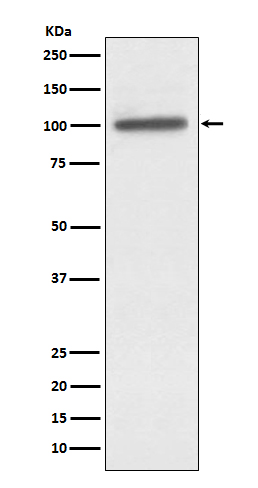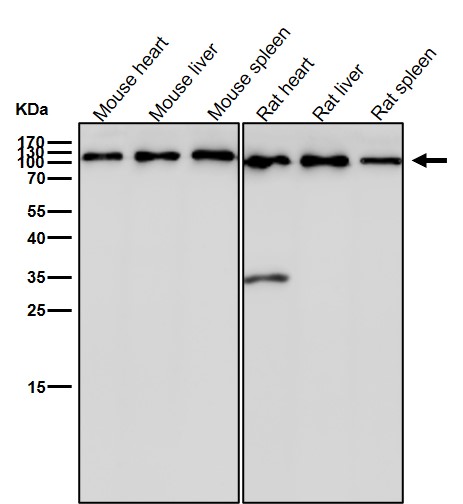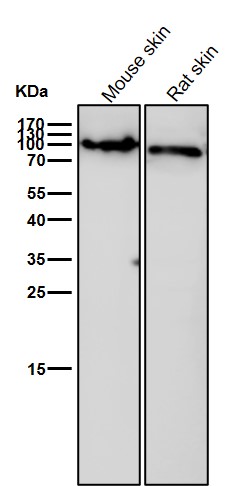


| WB | 咨询技术 | Human,Mouse,Rat |
| IF | 1/20-1/50 | Human,Mouse,Rat |
| IHC | IHC:1/100-1/200;IHF:1/50-1/200 | Human,Mouse,Rat |
| ICC | 1/50-1/200 | Human,Mouse,Rat |
| FCM | 1/20-1/100 | Human,Mouse,Rat |
| Elisa | 咨询技术 | Human,Mouse,Rat |
| Aliases | actinin 4; Actinin alpha 4; actinin4; ACTN 4; Alpha-actinin-4; F actin cross linking protein; Focal segmental glomerulosclerosis 1; FSGS1; Non muscle alpha actinin 4;;alpha Actinin 4 |
| WB Predicted band size | 105 kDa |
| Host/Isotype | Rabbit IgG |
| Antibody Type | Primary antibody |
| Storage | Store at 4°C short term. Aliquot and store at -20°C long term. Avoid freeze/thaw cycles. |
| Species Reactivity | Human,Mouse,Rat |
| Immunogen | A synthesized peptide derived from human alpha Actinin 4 |
| Formulation | Purified antibody in PBS with 0.05% sodium azide,0.05% BSA and 50% glycerol. |
+ +
以下是3篇涉及α-Actinin4抗体的文献摘要信息(基于真实研究简化整理):
---
1. **文献名称**: *α-Actinin-4 mediates podocyte injury in diabetic nephropathy through interacting with CD2AP and accelerating mitochondrial dysfunction*
**作者**: Li X, et al.
**摘要**: 研究利用α-Actinin4抗体进行免疫共沉淀和免疫荧光实验,发现α-Actinin4在糖尿病肾病足细胞损伤中通过与CD2AP相互作用加剧线粒体功能障碍,促进细胞凋亡。
---
2. **文献名称**: *Actinin-4 in Bladder Cancer Cells Promotes Invasion and Acts as a Biomarker for Aggressive Tumors*
**作者**: Honda K, et al.
**摘要**: 通过Western blot和免疫组化(使用α-Actinin4特异性抗体),研究发现α-Actinin4在侵袭性膀胱癌细胞中高表达,并通过调控肌动蛋白重组增强癌细胞迁移和侵袭能力。
---
3. **文献名称**: *Mutations in ACTN4 Cause Focal Segmental Glomerulosclerosis via Altered Actin Dynamics*
**作者**: Kaplan JM, et al.
**摘要**: 该研究通过α-Actinin4抗体染色发现,ACTN4基因突变导致肾小球足细胞骨架异常,引发局灶节段性肾小球硬化(FSGS),揭示了α-Actinin4在维持足细胞结构中的关键作用。
---
如需具体文献来源或发表年份,可进一步提供数据库检索关键词(如PubMed ID或DOI)。
Alpha-actinin-4 (ACTN4) is a cytoskeletal protein belonging to the spectrin superfamily, primarily involved in crosslinking actin filaments to maintain cell structure, adhesion, and motility. It is encoded by the *ACTN4* gene and is highly expressed in tissues with dynamic actin networks, such as kidney podocytes, muscle cells, and certain cancer cells. Structurally, it contains an N-terminal actin-binding domain and a C-terminal calmodulin-like domain, enabling interactions with signaling molecules. Dysregulation of ACTN4 is linked to diseases, including focal segmental glomerulosclerosis (FSGS) due to genetic mutations, and cancer metastasis via enhanced cell migration.
Antibodies targeting ACTN4 are essential tools for studying its biological roles and pathological mechanisms. They are widely used in techniques like Western blotting, immunofluorescence, and immunohistochemistry to detect expression levels, subcellular localization, and interactions in cellular models or clinical samples. Polyclonal antibodies often recognize conserved regions, while monoclonal antibodies provide specificity for particular isoforms or post-translational modifications. Some antibodies are designed to distinguish mutant forms of ACTN4 associated with hereditary kidney diseases. In research, these antibodies help elucidate ACTN4's role in cytoskeletal remodeling, mechanotransduction, and cancer progression. Commercially available antibodies are typically validated for cross-reactivity and performance across species (human, mouse, rat), supporting both basic research and diagnostic applications, such as identifying ACTN4 mutations in renal biopsies.
×